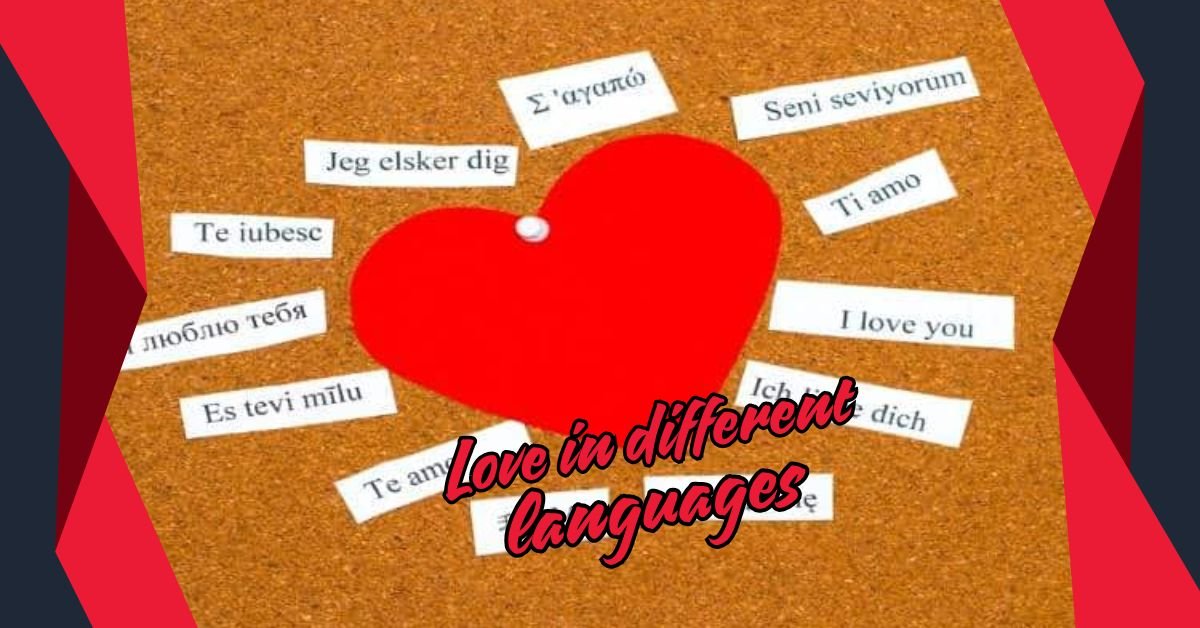Love is one of the most universal emotions that transcend borders, cultures, and languages. Despite the differences in how we communicate, the desire to express affection remains deeply ingrained in every society. However, the way people say “I love you” and express love varies widely. This diversity in expression reflects the unique values, traditions, and perspectives of different cultures. In this blog post, we will explore how the simple phrase “I love you” changes in various languages and cultures and what these differences mean for relationships worldwide.
Why Love is Universally Expressed in Different Languages
Love is an emotion that connects us all, regardless of where we come from or the language we speak. The phrase “I love you” is universally understood, even if it’s not always said in the same way. Across different cultures, love is not just a feeling—it’s a powerful force that shapes relationships, families, and communities. The way love is expressed verbally can reveal a lot about the cultural values of a society.
For instance, in many Western cultures, saying “I love you” is a common way to express romantic affection. In contrast, some cultures may view love as something more deeply tied to action rather than words. This distinction shows that love is not a one-size-fits-all emotion, and the ways in which we express it can vary widely.
The cultural nuances of how love is expressed can be influenced by history, language structure, and societal norms. Understanding how people in different cultures say “I love you” can give us a deeper appreciation of both the universality and the complexity of this emotion.
Top 10 Most Romantic Ways to Say “I Love You” in Different Languages
While saying “I love you” is a common expression in many cultures, how it’s said varies greatly. Here are some of the most romantic ways to express love across the globe:
In French, one of the most romantic languages, the phrase “Je t’aime” captures the essence of affection with a sense of passion and tenderness. The French have long been associated with romance, and the simplicity of this phrase emphasizes sincerity and depth.
In Spanish, a similarly passionate language, “Te quiero” and “Te amo” both mean “I love you,” but they differ slightly in their intensity. “Te quiero” is often used in less formal or non-romantic contexts, while “Te amo” is reserved for deeper, romantic relationships.
In Italian, the language of love, saying “Ti amo” is a heartfelt way to express affection. Italy’s rich cultural history in art, music, and literature makes it no surprise that the country has one of the most romantic phrases to express love.
In Japanese, the phrase “Aishiteru” holds significant meaning, though it is not used lightly. In Japanese culture, love is often shown through actions rather than words, so saying “Aishiteru” is reserved for moments of deep emotional connection.
In Arabic, “Ana behibek” (for men) or “Ana behibik” (for women) is a common way to express love. The Arabic language is known for its poetic quality, and the words for love carry a sense of admiration and reverence.
In German, love is expressed as “Ich liebe dich”. Though German might not be as immediately associated with romance as languages like French or Italian, the directness of this phrase makes it all the more meaningful.
In Portuguese, saying “Eu te amo” is an intimate and affectionate expression of love. The Portuguese language is rich with romantic connotations, making this phrase even more powerful.
In Korean, the phrase “Saranghae” is used to express love, though it is often saved for serious relationships. The Korean culture places a strong emphasis on loyalty and respect, which is reflected in the way love is expressed.
In Mandarin Chinese, the phrase “Wǒ ài nǐ” (我爱你) is used to convey deep affection. Chinese culture tends to be more reserved in public displays of affection, but this phrase holds significant emotional weight in private moments.
In Russian, love is expressed as “Ya tebya lyublyu”. Russian culture places a heavy emphasis on loyalty and commitment, and saying “I love you” is often a serious and intentional declaration of one’s feelings.
How Saying “I Love You” Differs Across Cultures
While the phrase “I love you” is understood universally, the way it’s used and the cultural context surrounding it can vary significantly. For example, in some cultures, saying “I love you” might be reserved for serious romantic relationships, while in others, it might be more casually used among friends and family.
In Asian cultures, such as in Japan and China, expressing love verbally is less common compared to Western countries. In Japan, words like “Aishiteru” carry a heavy weight, and people often express their love through actions rather than words. Similarly, in Chinese culture, the phrase “Wǒ ài nǐ” is significant, but acts of service or gestures of love are often considered more meaningful than saying the words.
In contrast, Western cultures—such as in the United States and parts of Europe—tend to use the phrase “I love you” more freely, not just in romantic relationships, but also in family and friendships. In these cultures, saying “I love you” can be an everyday part of conversation, reflecting the emotional expressiveness of these societies.
The Most Beautiful Ways to Express Love in Different Languages
Sometimes, it’s not just about saying “I love you,” but how love is expressed in other ways. Across different cultures, people have unique ways of showing affection that go beyond just words.
For example, in French culture, love is often expressed through poetry, music, and art. The French have a long history of romantic writers and artists, and the concept of “l’amour” is closely tied to beauty and creativity. In Italian culture, food and family are often seen as expressions of love, where sharing a meal together is a way of bonding.
In Latin American cultures, love is often conveyed through music and dance, with salsa, tango, and other forms of dance being seen as romantic expressions. The act of dancing closely with a partner is seen as a form of communication where words fail.
In Middle Eastern cultures, expressions of love often focus on family and loyalty. The phrase “Ana behibek” is used not just between lovers, but also between family members, reflecting the deep cultural importance of family bonds.
Interesting Facts About Saying “I Love You” in Different Languages
Did you know that in some cultures, “I love you” is never directly said? For instance, in Finland, the Finnish phrase for “I love you” is “Rakastan sinua”, but it’s not something that people say casually. Finnish culture values actions over words, and expressions of love are often shown through deeds rather than vocalizing affection.
In Iceland, people may not often use the phrase “I love you” but show affection through simple gestures such as sharing a meal, spending quality time together, or caring for one another. In fact, “Íslenska” (Icelandic) speakers are known to express love through meaningful actions that demonstrate care and commitment rather than relying on words.
The Meaning Behind “I Love You” in Different Languages
The phrase “I love you” is not just a collection of words. In every language, it carries emotional weight and significance. It reflects the culture’s view of love, its importance in relationships, and how it should be expressed. Understanding how different cultures express love can also give us insight into the values and priorities of those societies.
In Spanish, the word for love, “amor,” is closely tied to passion and intensity. The use of both “Te quiero” and “Te amo” reflects varying levels of affection, where “Te quiero” can denote a less intense affection, while “Te amo” is reserved for deep, romantic love.
In Arabic, the concept of love is deeply spiritual and often linked to devotion. When a person says “Ana behibek”, it’s not just an expression of personal affection, but also a sign of devotion and commitment.
In German, while the phrase “Ich liebe dich” may sound more direct, it still carries deep emotional significance. Germans tend to be straightforward with their emotions, but the honesty in expressing love is highly valued.
Conclusion
Love is a universal feeling that transcends borders and languages. The way people express love, however, varies widely across different cultures, reflecting the unique values, traditions, and customs of each society. Whether it’s through a simple phrase, a meaningful gesture, or a heartfelt action, expressing love is a way for people to connect with one another and form lasting bonds.
In every culture, the phrase “I love you” carries a different significance and emotional weight, but its meaning is always clear: love is something worth celebrating. By understanding how love is expressed in different languages, we can better appreciate the diverse ways people from around the world experience and communicate this powerful emotion.
FAQs About Love in Different Languages
1. What is the most romantic way to say “I love you”?
The most romantic way to say “I love you” depends on the culture, but phrases in French, Italian, and Spanish are often considered particularly romantic due to their melodic sounds and cultural associations with romance.
2. Why don’t some cultures say “I love you” often?
In some cultures, like in Japan and Finland, love is more often shown through actions rather than words. These cultures place a greater emphasis on non-verbal expressions of affection and loyalty.
3. How do people in China express love?
In China, people say “Wǒ ài nǐ” (我爱你), but love is often expressed more subtly through actions such as caring for family and showing respect. Public displays of affection may be more reserved in Chinese culture.
4. Can “I love you” be said casually in every language?
No, in many languages, such as Japanese or Russian, saying “I love you” is a serious and meaningful declaration reserved for close relationships. It’s not something said casually or frequently.
5. How is love expressed differently in Italian culture?
In Italy, love is often expressed through actions like sharing meals with loved ones, giving thoughtful gifts, and showing appreciation for beauty in art and nature.
6. What’s the significance of saying “I love you” in Arabic?
In Arabic, saying “I love you” conveys deep devotion and commitment. It’s often associated with not just romantic relationships but also family loyalty and affection.
7. Is saying “I love you” in Spanish different in romantic versus casual settings?
Yes, in Spanish, “Te quiero” is used more casually, while “Te amo” expresses a deeper, more intense romantic love.
8. Do all cultures have a specific phrase for “I love you”?
Most cultures have some way of expressing love, whether verbally or through actions, but the frequency and formality of saying “I love you” can vary greatly between cultures.
9. How is love expressed in Korean culture?
In Korean culture, saying “I love you” (“Saranghae”) is less common, and people often show love through acts of service, respect, and loyalty.
10. What’s the most romantic language for love?
While French, Italian, and Spanish are often regarded as some of the most romantic languages due to their fluid and melodic sounds, the idea of romance is subjective and can vary based on personal preferences and cultural perspectives.










